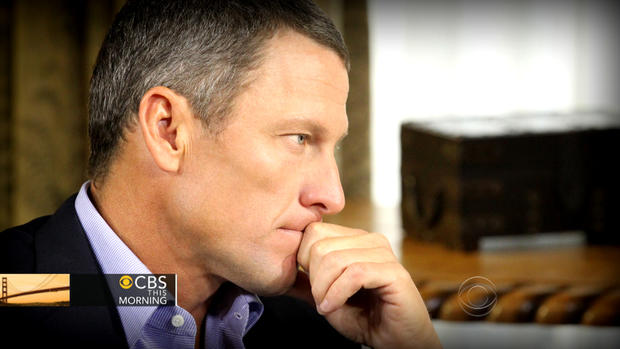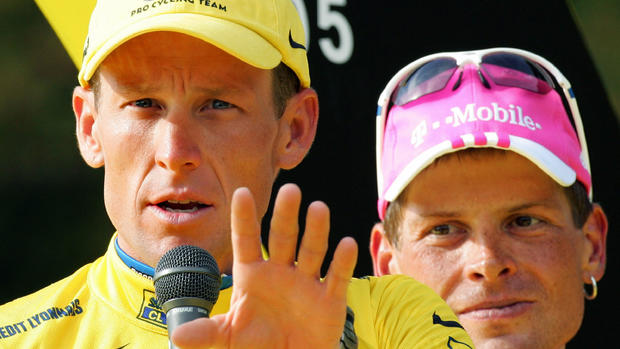Fifty shades of Lance Armstrong
Over time, public figures and athletic icons have survived injury, illness, bankruptcy, and brutal attack. They have survived disease and war and have had redefined infidelity into the lesser charge of marital indiscretion. Professional athletes have returned from prolonged periods of slump only to be hailed as the heroic clutch savior who arose from the performanative dead in time to save the world and the playoff season.
There are few narrative themes in popular culture as resonant as the returning but sinful Odysseys, the contrite Prodigal Son, and the self-healed sickly one who now stands as tribal shaman. Lance Armstrong appears to be moving in these directions. His journey is far, however.
But perhaps the greatest challenge for the fallen sports hero is to make amends with a sports fandom they have continually deceived over time. This rabid collective of now-jilted followers who stand stupefied at the water cooler holding a Ben Johnson bobble-head or a Marion Jones poster signed, "All the best," are poised and ready for revenge. "How dare you cheat to win," the seething masses ask. But they quietly reflect on their own indiscretions.
The fallen sports hero reminds us up close and personal just how close the link is between the finite reality of our humanness and the myth of the supernatural performer. And in that narrow space between what we believe and what we want to believe, sits a proud defrocked kid from Plano, Texas surrounded by a fatherless past and a bank of $400/hour lawyers.
###
Before I was a world champion I was a fatherless kid with no bank account. And somewhere between the time my father died of cancer when I was 15 years old and my first of many athletic victories, I met Lance Armstrong. More accurately, I had met his mother first. She and I were closer in ages and ideology. But then one spring in the late 80's he rolled onto my Del Mar, California driveway with another pimply-faced kid from that Longhorn State in something like a '68 Camaro painted bar-b-cue black and dripping oil. "What are you doing here, Junior? And get that piece of s*** off my driveway." He was barely 16 and his blind brashness reminded me of my own ambition. We would become friends.
Within that claim of friendship, the essence of his current dilemma might be better examined.
Lance is my friend not like Laird Hamilton or Mary Decker Slaney or Herschel Walker might be my friends. I've met them, shared a few drinks, chatted a bit about something banal, and took a picture if someone asked. They wouldn't recognize me in a hazy bar. But Lance is my friend partly because we share a cancerous history and partly because he's always been kind to me. So, regardless of his choices or tactics, however misanthropic, I along with millions who are suffering from cancer or simply want to believe, leave a light on for him. Lance is not my friend because of what he represents of sports in our world and what it brings and takes and provides and steals from us. These are things that interest me and that enable a livelihood. He is my friend because his mistakes are every athlete's blind ambition run wild on the heels of those that profit from our performance. And on that basis, he is as close or far away from me as anyone who has revered or hated him.
The study of Lance Armstrong is the study of a confusing relationship to our sports heroes. As one of my students claimed, "I wanted so badly for him to be innocent that I'm really having trouble convincing myself he's guilty, even after he's told us these things." I imagine the say-it-ain't-so kid wondering why his hero lied; wondering if any hero who wasn't a shiny cartoon figure was even possible. I want to be so mad. And I struggle in finding a way to indict a man who is but a product of a society bent on winning at all costs; a society that sells energy drinks to 12 year olds and breast augmentation to high school seniors.
He is the most polarizing public figure since Fidel Castro.
Perhaps one of his greatest contributions to our social worlds is that he has quite by accident caused us to think about how sport and victory function in our lives. It ain't about the bike and it ain't just about a high stakes ride around the French Alps. Everybody has an opinion on Lance Armstrong because what he did or didn't do has caused us to think about what we might or might not have done.
With Armstrong, as with most infamously public figures, we do ourselves a grand disservice by attempting to reduce their person and their actions into a clear and cogent characterization - some palatable idea that acts in service of our tidy idea of how they f*****d things up for all to see. Armstrong is a product of sporting train gone off the tracks. But he was driving it and many, many people want him to pay for the wreck. As he should.
But how does one make restitution for what someone called, "perhaps the biggest scam in sports since the 1919 Chicago White Sox?" Can you put a price on deceit and if so, to whom shall we send the bills for what so many elite athletes and politicians have engaged in under the guise of winning? Vice President Joe Biden once called steroid use in sports "simply un-American." It is so, Joe! America has often tweaked and twisted the rules to gain an advantage, exercised situational ethics in service of some idea of a greater good. Manifest Destiny was not a reasoned decision and we don't sit in the stands and yell, "We're number two or three!"
So, Armstrong the American Capitalist faces a court of popular opinion founded on teleology; that somehow the ends will justify the means. Millions raised for Livestrong and cancer research justify millions spent by the tax payer's U.S. Postal Service to sponsor his cycling team. Collateral damage perhaps or simply the cost of doing hero business? And we somehow fail to remember that with Armstrong or any heroic public figure, without an adoring public there is no hero to figure--the "unsung hero" as oxymoron.
Much of Armstrong's vilification seems tied to his purported tyrannical-style of management. If Lance had tried to kick my ass, I'd probably be pissed off as well. But I don't know him as a bully. As a journalist, I'm more disappointed in his choice to hire ghost writers for his books rather than hunker down and pen his own fascinatingly-heroic life. No doubt he ran roughshod over more than a few. As did other greater and lesser figures in our American past. No doubt he could be an a**hole and a gentleman and a caring man who honestly cared about the 13 million who currently live with cancer. No doubt his chief lieutenants cum pariahs- Tyler Hamilton and Floyd Landis-- now stand as courageous whistleblowers, not snitching scum. Theirs are stories equally as rife with hand-wringing ethics and head-holding personal conflict. No doubt there were dozens if not more partners and players who profited handsomely from his exalted status in the cycling industry they and Lance reshaped and who now play the quiet Pontius Pilate in the gleaming corners. And to my thinking, there is little doubt that if professional cycling was contested drug free during his career, Lance Armstrong would still have won many, many titles.
The argument that "they were all doing it so what does it matter?" is pathetic fallacy. Performance enhancing drugs--if you can afford and manage them-- affect every athlete differently. The real pathos is that we'll never know who the best natural cyclists were of the past 20 years.
Of late, our relationship with heroes has twittered into an ambiguous psychosis. As soon as we conceive one in some idealistic fashion, another one is busted for a bar fight. And all that we have invested in them and their other-worldly skill come crashing down. But we are a forgiving group and all it takes is a contrite mea culpa, a few honest tears, another non-profit foundation and the great healer--Time.
Lance will land on his feet. The private jet will be gone but he may very well have his shot at racing on the world's stage again. It's what athletes do; what is the hardest thing to let go. He will do battle in the courts and then settle smartly and act out the senior statesman's role which, in some oddly twisted way, I think he has the ability to play quite well. But he'll have to earn this one the same way he earned his life after cancer--the hard way, the clean way.
Scott Tinley is a two time World Triathlon Champion. He teaches sport humanities in the California State University system and holds a Ph.D. in Cultural Studies from Claremont Graduate University. His book, Things to Be Survived, explores the fallen hero and their redemption.

